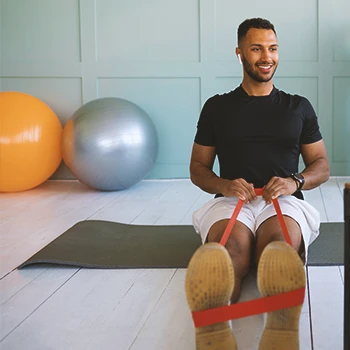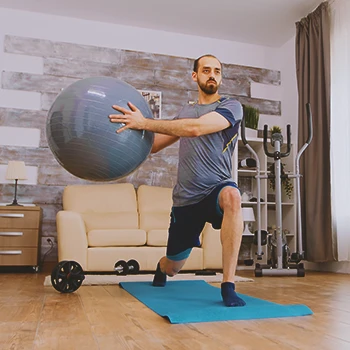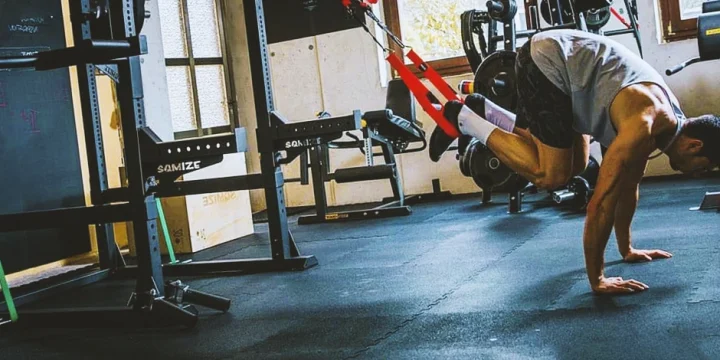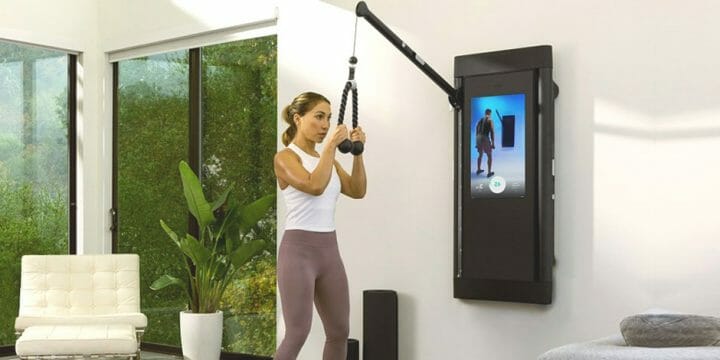If you, like many of my fitness clients, are looking for a way to get fit and stay healthy without leaving your home’s comfort zone, then investing in setting up a gym at home might be worth considering.
These gyms are convenient and cost-effective, and they enable you to have an effective workout tailored to your needs.
With all these benefits, it’s easy to see why more and more people are turning towards personal gyms as their go-to fitness source.
Let’s examine some pros and cons of working out at home.
Quick Summary
- Investing in a home gym is beneficial for those seeking long-term cost savings, privacy, and convenience in their fitness routine.
- Home gyms offer the convenience of working out anytime and the ability to tailor fitness routines to individual needs and preferences.
- According to research done by RunRepeat, the average gym membership in 2021 ranged from $31 to $44 a month, while it takes as little as $50 to set up a basic home gym.
- According to several of my clients, the autonomy and comfort of a home gym significantly outweigh the initial investment and space requirements.
Is a Home Gym Worth It?

A home gym is worth it if you want to save money over the long term, prefer a more private workout space, or have a schedule that makes getting to commercial gyms difficult.
Having your own home gym can mean something different to each person you ask.
Some envision their dream gym set up in their garage, while others picture their foldable rowing machine they pull out from under the bed in the spare room when they want to work out.
So, if you’re looking for an effective way to stay fit from the comfort of your own home, investing in high-quality CrossFit home gym equipment is definitely worth considering.
Whatever the term home gym means, let’s look at some benefits and downsides.
What Are The Benefits of Having a Home Gym?

There are numerous benefits to having essential home gym equipment, from cost savings to convenience.
1. Cost Savings Overall
While there may be a high initial investment for equipment and the best home gym flooring, a home gym can save you money in the long run by avoiding a monthly gym membership.
According to research by RunReport, the average gym membership in 2021 went from $31 to $44 a month [1]. This was around $500 for a year for high-end gyms.
On the other hand, setting up a home gym requires a larger investment, but pays off long term, which many of my clients confirmed.
The cost of a home gym can range dramatically depending on its features and capabilities.
The good news is that there are countless basic to high-end options, so you can likely build a setup that fits your budget.
Related: How to Get Cheap Home Gym Equipment?
2. Convenience
Home gyms make it easy to stay fit without leaving the house, benefiting those who don’t have the time or desire to visit a commercial gym routinely.
With a home gym setup, you have total control over your environment, fitness routine, and schedule, a luxury not often found at your local gym.
“A home gym offers convenience since you may be more likely to do a quick workout when you’re short on time. However, your setup may be limited and you may have more distractions.”
- Emily Cronkleton, Certified Yoga Instructor.
3. Motivation

While some people need social interaction, friendly competition, and encouragement from a personal trainer or gym buddy, others prefer a solitary workout environment in their own gym.
Some of my clients say that the solitude of their home gym boosts their motivation, allowing them to focus without the distractions of a public gym setting.
Additionally, being able to work out anytime and customize and personalize workout routines can give you more control and motivate you in your fitness journey.
4. Comfort
Some people find gym routines intimidating and the atmosphere uncomfortable and judgy.
Working out at home offers comfort that many don’t find at the local gyms, particularly if they are new to exercise, need to drop body weight, or are in poor physical health.
5. Psychological Benefits
The comfort and privacy of a personal workout space can significantly reduce stress and anxiety levels.
Unlike public gyms, where the environment can be intimidating or distracting, a home gym offers a sanctuary where you can focus solely on your well-being.
The flexibility of a home gym allows you to tailor your workout routine not just to your physical needs but also to your emotional state.
Feeling stressed? Engage in some high-intensity interval training to release endorphins. Need to unwind? Opt for a calming yoga session.
This adaptability is crucial in maintaining not only physical fitness but also mental balance.
6. Customization and Personalization
Here's how you can customize and personalize your home gym:
- Designing for your unique needs: Whether you're training for a marathon, focusing on bodybuilding, or incorporating yoga and Pilates into your routine, your home gym can be equipped with the exact tools you need, which isn't possible in a public gym setting.
- Accommodating personal preferences and disabilities: For instance, if you have a knee injury, you can equip your gym with low-impact exercise machines.
- Evolving with you: You can add or remove equipment based on your changing fitness levels, interests, and goals. It's a dynamic space that grows and adapts with you, offering a personalized fitness experience that is hard to find elsewhere.
Related Article: Gym Membership vs Home Gym
What Are the Cons?

While there are certainly benefits of exercising at home, there are some cons to consider.
Let’s take a look.
1. High Initial Costs
If you choose to work out at home, you will eventually want to invest in some equipment, but you can do this over time.
At the beginning, start with bodyweight exercises, which don’t require equipment, and you’ll have a challenging workout with no initial cost.
If you want to do cardio straight away, you’ll want to think about equipment like a stationary bike or an elliptical trainer.
There is a wide range of cardio equipment options to fit any budget, but remember, quality is important.
If your workout preferences center around resistance training, a power rack and some dumbbells, kettlebells, and resistance bands for your home gym setup are a good investment.
2. Space

Doing a full workout in a small enclosed space is one of the biggest challenges of a home workout.
Venturing out to a gym gives you a wide variety of equipment, including a squat rack, free weights, a spin bike, and a treadmill with plenty of space to exercise.
3. Isolating
One study completed during the COVID-19 pandemic shows that working out with others contributes to physical and mental health, including self-esteem.
According to a study in the National Library of Medicine, technology and social media play a crucial role when working out in isolation [2].
Proper form is significant when performing exercises. Working out alone at home has taught me the importance of self-monitoring for the correct form to prevent injuries.
Mirrors, trainers, or workout partners at the gym are an excellent way to ensure you are doing the exercise correctly and safely to avoid injury.
FAQs
What Should I Buy First When Building a Home Gym?
The first things you should buy when building a home gym are versatile items like dumbbells, kettlebells, a pull-up bar, a jump rope, and resistance bands that offer countless workout options.
Do Home Gyms Increase a Home’s Value?
Whether a home gym will increase a home’s value depends on many factors, including neighborhood, potential buyers, where it is in the house, flooring, ventilation, and power.
References:
- https://runrepeat.com/gym-membership-cost
- https://www.ncbi.nlm.nih.gov/pmc/articles/PMC7673425/
About The Author
You May Also Like






